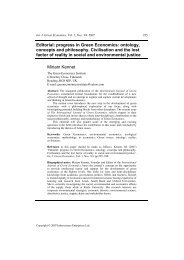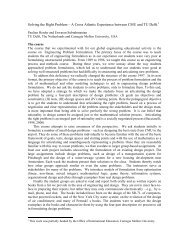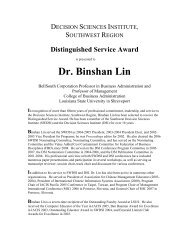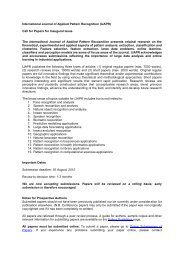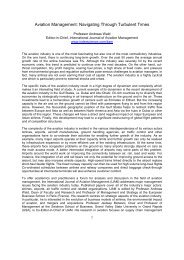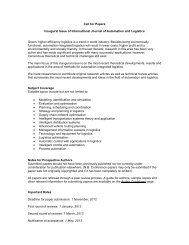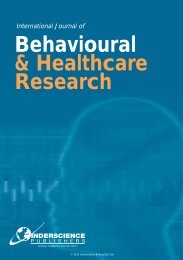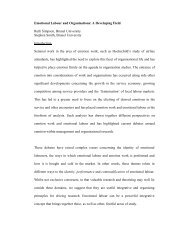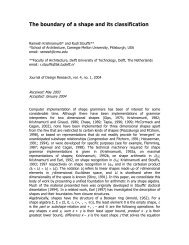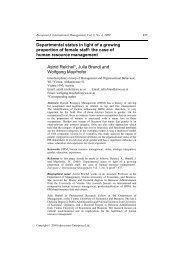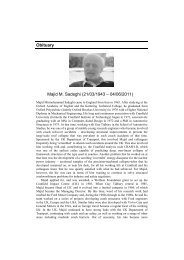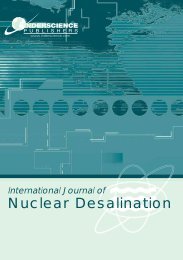A new Zeitgeist for international business activity and ... - InderScience
A new Zeitgeist for international business activity and ... - InderScience
A new Zeitgeist for international business activity and ... - InderScience
You also want an ePaper? Increase the reach of your titles
YUMPU automatically turns print PDFs into web optimized ePapers that Google loves.
292 J.H. Dunning<br />
Accepting the merits of this paradigm, the intellectual contribution of scholars has been<br />
(<strong>and</strong> still is) judged mainly by the content, relevance <strong>and</strong> sophistication of the research<br />
methodology they use, <strong>and</strong> their ability to skilfully manipulate it.<br />
Table 7 sets out the contents of the HE which, we believe, should be, incorporated<br />
into mainstream IB research. The observations are largely self-evident. They reflect our<br />
contention that the evolving global environment dem<strong>and</strong>s a <strong>new</strong> (or complementary)<br />
<strong>Zeitgeist</strong> of scholarship; <strong>and</strong> one which more explicitly incorporates the role of<br />
institutions, <strong>and</strong> poses challenges <strong>for</strong> the logical positivism embraced by most<br />
researchers, economists <strong>and</strong> many management scholars (Ghoshal, 2003). Let us briefly<br />
exp<strong>and</strong> upon this latter point.<br />
Table 7<br />
IB scholarship: the human environment<br />
Up to early 2000s HE largely subsumed in PE paradigm<br />
But earlier work by Veblen <strong>and</strong> Commons, <strong>and</strong> later by Simon, Coase, North <strong>and</strong> Williamson<br />
has focused on HE<br />
But institutions largely marginalised by main stream IB disciplines<br />
Today it is better recognised that institutions are important <strong>for</strong> underst<strong>and</strong>ing <strong>and</strong> explaining<br />
determinants <strong>and</strong> impact of IB <strong>activity</strong><br />
Exceptions<br />
Internalisation/transaction cost theory – but this largely assumes rationality of intent <strong>and</strong><br />
ergodicity<br />
Organisational theory<br />
Yet still only limited attention is given to cross border market failures (e.g., institutional<br />
distance): approach is static: <strong>and</strong> IB models tend to ignore intentions of decision takers, <strong>and</strong><br />
consider only limited institutional options<br />
Critique by Ghoshal, <strong>and</strong> by Sullivan <strong>and</strong> Daniels<br />
A stages/dynamic approach to a <strong>Zeitgeist</strong> in scholarship<br />
No dominant paradigm of methodology<br />
Value of interdisciplinary research<br />
We have already argued that trends in the global economic scenario are associated<br />
with, or are leading to, the unpredictability of many future events; <strong>and</strong> where past events<br />
<strong>and</strong> observations have a zero probability of recurring (North, 2005). Unexpected<br />
technological change, <strong>new</strong> uninsurable risks, natural disasters, increased insecurity,<br />
unanticipated shifts in ideologies <strong>and</strong> political volatility, each point to a <strong>Zeitgeist</strong>,<br />
where received scholarly wisdom <strong>and</strong> mainstream methodologies are of limited use in<br />
guiding either <strong>business</strong> managers or policy makers in their future actions. Essentially<br />
such unpredictability arises <strong>for</strong> two reasons. The first is that the goals <strong>and</strong> intentions of<br />
decision takers are becoming less stable, more multifarious <strong>and</strong> increasingly non-rational.<br />
Partly this reflects their greater freedom of choice. While some changes may be <strong>for</strong>eseen<br />
<strong>and</strong> can be built into existing paradigms, others such as technological breakthroughs,<br />
e.g., stem cell research, <strong>and</strong> unexpected changes in the HE, e.g., as fashioned by<br />
terrorism, require a reappraisal of existing models of intent.<br />
The second aspect of unpredictability concerns sudden <strong>and</strong> totally un<strong>for</strong>eseen changes<br />
in the HE or PE. Taking the locational attractions of the UK as an example, it may be<br />
possible ex post to identify the key variables which the investing firms took into account




